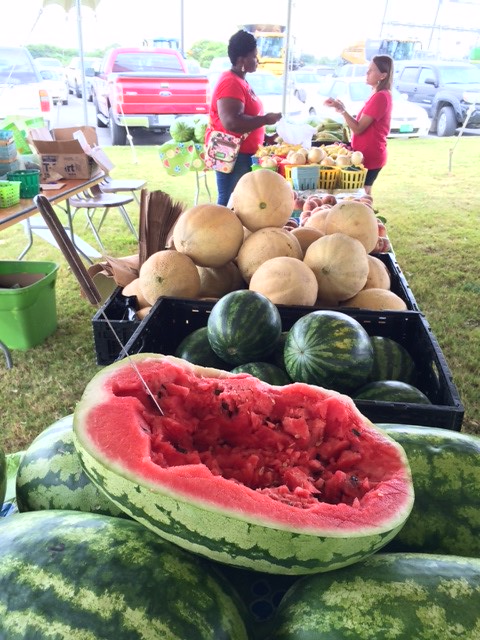Rise of ‘foodies,’ local food movement gives birth to farming newbies
By Dave Edmark
U of A System Division of Agriculture
Fast facts:
- Farmers market vendors, small producers targeted for enrollment
- Four class sessions scheduled in both Russellville, Fayetteville
- Contact Pope or Washington county extension offices to register
- Business, crop production, marketing, livestock production to be covered
(670 words)
FAYETTEVILLE, Ark. – The rise of foodies and the local food movement have helped give birth to a new generation of farming newbies hungry to learn to win customers and how to grow the best crops they can, say Benton County extension agents with the University of Arkansas System Division of Agriculture.
“Research has shown customers are willing to pay more for locally grown, fresh, unique, high quality foods,” said Neal Mays, Benton County extension agent. “We have entrepreneurs tapping the market here because these items are in demand, or the average consumer can’t or won’t grow the food themselves, and these younger, newer farmers are stepping up to provide goods people want.”
To help these growers, Mays and fellow Benton County Staff Chair Johnny Gunsaulis, have organized “Back to the Farm,” a series of classes to help growers learn about direct marketing – such as farmers markets – and other needs such as irrigation, managing cash flow and food safety regulations.

Fewer going into farming
The 2012 Census of Agriculture found that the number of new farmers declined 20 percent nationwide since the last census in 2007. Many of these new farmers were more likely to spend some time working off the farm and less likely to consider farming their primary occupation. They also tended to be younger, with the national average being 46.9 years of age.
“The difficulty of new folks -- and especially the younger generation -- to get into farming has been recognized by our planning committees and also the County Extension Council,” Gunsaulis said. “In Northwest Arkansas, the job market brings in a lot of families each month. Many of these families desire the lifestyle of country living. Also, a lot of folks who were raised here on farms find themselves employed in town but still wanting their families to experience the country lifestyle.
“These workshops are designed to give these folks a better chance of success in making their operation into an actual business and not just a recreational activity,” he said.
The classes will be offered during February from 6 to 8 p.m. on Monday nights in Russellville at the Pope County Extension Office at 105 W. B St. and on Tuesday nights in Fayetteville at the Pauline Whitaker Animal Science Center at 1335 W. Knapp Drive. The classes are free but it’s important to register in advance because of limited class sizes. To register, call 479-968-7098 for the Russellville classes or 479-271-1060 for the Fayetteville classes.
Mays also said that he’s “visited with vendors who are interested in improving their production with specific crops, so we’re hoping to get some research-based recommendations into their hands and also give them a chance to meet resource people they need to know.”
The class schedule will be:
- Feb. 1 (Russellville) and Feb. 2 (Fayetteville) – Farm business management: this session covers developing and writing business and financial plans, finding sources of capital, grants and financing, managing cash flow, recordkeeping, farm insurance and banking.
- Feb. 8 (Russellville) and Feb. 9 (Fayetteville) – Specialty crop production from farm to fork: this class will review basics of crop production, matching horticultural crops to farm resources, pest management, irrigation, generally accepted practices and food safety.
- Feb. 15 (Russellville) and Feb. 16 (Fayetteville) – Marketing your farm: the class will discuss wholesale and direct marketing, branding, agritourism, recognizing and meeting market demand and farmers market best management practices.
- Feb. 22 (Russellville) and Feb. 23 (Fayetteville) – Livestock production on small acreages: the final session will cover species and breed selection, purchasing tips, fencing, watering, housing requirements, feeding livestock, pasture management and food safety.
Mays said he hopes that discussions with producers who take this series of classes will lead to courses on other topics. “We want to do what we can to support farmers and increase interest in other extension programs,” he said. “I’d like to see come out of this requests for useful classes that we can put together.”
For more information about horticulture, food safety or marketing, contact your county extension office.
Pursuant to 7 CFR § 15.3, the University of Arkansas System Division of Agriculture offers all its Extension and Research programs and services (including employment) without regard to race, color, sex, national origin, religion, age, disability, marital or veteran status, genetic information, sexual preference, pregnancy or any other legally protected status, and is an equal opportunity institution.
Media Contact: Dave Edmark
U of A Division of Agriculture
(479) 575-6940
dedmark@uark.edu
Related Links